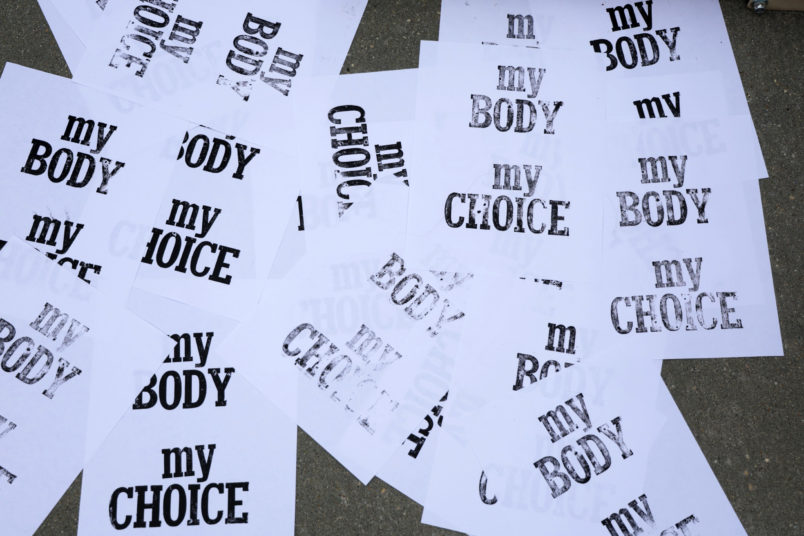
WASHINGTON, DC - MAY 03: Flyers that read "My Body, My Choice" are seen in front of the U.S. Supreme Court May 3, 2022 in Washington, DC. In a leaked initial draft majority opinion obtained by Politico
By Nicole Lafond
TPM
There’s lots of brilliant think pieces from reporters, scholars and political observers to consume today to help wrap one’s head around the gravity of the last 24-hours. Here’s another take to add to the list this evening.
New York Times writer Max Fisher flagged a piece he published back in September 2021 here:
You should read the piece in full, but his global perspective helps string together a unique birds-eye-view correlation between developed nations, increasingly polarized politics, attacks on democracies and the roll-back of abortion rights. As Fisher notes in the piece, in the last two decades, we’ve seen more than 30 countries around the globe (some with a socially conservative and/or Christian-dominated populous) enact some form of legal expansion of abortion access for citizens. Only the United States, Poland and Nicaragua have done the opposite (as of his September 2021 writing).
Fisher spoke to several legal scholars to highlight the role a strong democracy plays in the longevity and strength of human rights laws in a given nation, specifically on the issue of abortion. But one particularly striking section of the article focuses on the growing phenomenon of minority rule in highly polarized societies.
While the makeup of high courts in democratic nations are, at least by design, meant to reflect public opinion, the current makeup of the U.S. Supreme Court obviously throws that ironclad rule out of whack. (And, as we know, public opinion on abortion is overwhelmingly in support of not overturning Roe, this Washington Post-ABC News poll on the issue just last week demonstrates that well.)
Citing Steven Levitsky, a Harvard University scholar on democracy, Fisher points out that the manipulation of certain systems that have perhaps long been controversial parts of a country’s grand experiment in democracy — like the U.S.’s Electoral College — have ultimately helped make the shift toward minority rule possible. And oftentimes the party with more populist or precedent-breaking voices in their ranks are more likely to manipulate the systems or the scraps of a manipulated system to their advantage (it’s obvious, but think: McConnell’s grand Merick-Garlanding).
This section gets into it far more eloquently than I can:
Electoral College and Senate maps have always tilted American elections to favor certain voters over others, for instance by granting rural states outsized representation. For the first time in American history, demographic groups that tend to support one party, the G.O.P., overwhelmingly cluster in the areas that receive disproportionate voice.
As a result, Supreme Court justices are increasingly likely to be appointed by a president who lost the popular vote and confirmed by a Senate elected by a minority. Republicans won the national popular vote in only one out of the last eight presidential elections, but have appointed six of the nine current Supreme Court justices.
In democracies, a drift toward minority rule can feed a sense that power does not flow from the will of the people as a whole. Such leaders and institutions often become likelier to overrule the majority on issues important to the minority that put them in power. …
In societies with high polarization, he (Levitsky) has found, parties often fight bitterly for control of the courts. These contests tend to send a message, intended or not, that courts exist to serve partisan interests, rather than guard against them.
Rulings at odds with public opinion, Dr. Levitsky said, can become “very likely in a period of polarization and hardball politics.”
No comments:
Post a Comment